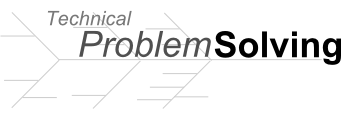I've also come across a blog posting about the Creativity Trigger. I might be misinterpreting it a bit, but one of the things the author mentions is being overloaded by information such that one doesn't have original thoughts but merely reforms what someone else has already done. Well he's a designer, and originality has more value in that area that for a scientist or engineer, but I think we can learn from him. While it is important to be linked, and exposed to many sources of information, you should also balance this with times of isolation. This can bring new solutions, approaches, and strategies towards our problems.
Like everything in life, we need to strike a balance in how we go about solving problems. You can't be everything at all times, so take the time to make a conscious shift in your approach from time to time.
Saturday, July 24, 2010
Subscribe to:
Post Comments (Atom)




1 comment:
One of the "patterns" we utilize at work is Incubation which also seems to trigger creativity and seems to be similar to the methods described in your post.
Incubation is one of the 4 proposed stages of creativity: preparation, incubation, illumination, and verification [1]. Incubation is defined as a process of unconscious recombination of thought elements that were stimulated through conscious work at one point in time, resulting in novel ideas at some later point in time [2].
Wikipedia: Incubation (psychology) has the following: The experience of leaving a problem for a period of time, then finding the difficulty evaporates on returning to the problem, or even more striking, that the solution "comes out of the blue", when thinking about something else, is widespread. Many guides to effective thinking and problem solving advise the reader to set problems aside for a time.
1. ^ Christensen, T. Bo (2005). Creative Cognition: Analogy and Incubation. Department of Psychology, University of Aarhus, Denmark
2. ^ Seabrook Rachel, Dienes Zoltan (2003). Incubation in Problem Solving as a context Effect
Post a Comment